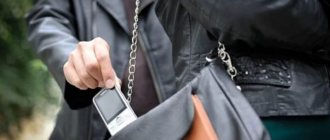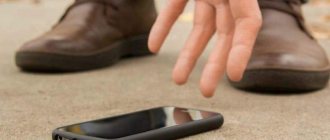What to do if you are accused of theft and who will be punished in the end?
If you are accused of theft, it is advisable to remain calm and familiarize yourself with your national laws to avoid charges and penalties.
In this article we will tell you what types of thefts there are and what laws govern them, what rights does the person accused of theft have, who and how establishes the crime, what actions should the person accused of theft take.
Legislation Rights of the accused Composition of a crime or misdemeanor Object Object Means of evidence Actions of the accused party In the store Through statements If you are guilty Responsibility Final score
The legislative framework
False accusations of theft are common these days - in a supermarket, in a cafe, at work, a boss who wants to hide unexpected expenses accuses one of his employees of theft.
Moreover, accusations of theft can come from the most unexpected sources - from acquaintances, colleagues and even friends. Having become convinced of someone else’s guilt, a citizen files a complaint with the police, after which an investigation will be carried out and, if confirmed, a charge of theft will be brought under Article 158 of the Criminal Code of the Russian Federation.
However, if verification of the theft allegation shows that the accusation is fabricated, the applicant himself will be held accountable, but under Article 128.1 of the Criminal Code of the Russian Federation “On Defamation.”
It should be remembered that in almost any situation it is possible to fabricate charges of theft. Example: a student saw a phone on the table that one of the university students had forgotten, and took it so that it would not be stolen, and asked his colleagues who it belonged to. Therefore, this action can be classified as theft.
Rights of the accused
In accordance with Art. 51 of the Constitution of the Russian Federation, every citizen of the Russian Federation has the right not to testify against himself or his loved ones, therefore, if you are accused of theft, which you have no doubt about, you can remain silent until you contact a lawyer (or receive guaranteed free legal assistance) .
It is also important to remember the principle of the presumption of innocence, according to which the accused remains innocent until he is proven 100% guilty.
It does not matter whether the accusation comes from an individual or a legal entity. Until you provide sufficient evidence to prove your guilt, you will be presumed innocent and will not be subject to arrest or other measures.
A person who is unable to pay for the services of a private lawyer has the right to free legal assistance from the state.
Any citizen who is confident that his rights and legitimate interests have been violated can protect himself by contacting one of the law enforcement or supervisory authorities in accordance with Art. 128.1 of the Criminal Code of the Russian Federation or Art. 152 of the Civil Code of the Russian Federation.
Corpus delicti
According to current regulations, only law enforcement officials (police, prosecutors) have the right to establish and confirm a crime.
Therefore, when a theft is reported, the police will conduct an investigative investigation to verify the information contained in the report. If the police refuse to carry out such an investigation, the applicant has the right to again appeal to a higher authority - the prosecutor's office.
Although this oversight body is not competent to review citizen petitions, its staff can direct law enforcement officials to focus on a specific citizen petition.
When it comes to filing a theft claim with the courts, it is advisable to do so only if the complainant has sufficient evidence that a crime has been committed.
Object, subject
The objective side of theft is property relations in one form or another. The subjective side is the property and money of other people.
In this case, we are talking about the hidden theft of property to which the criminal has no rights. The “secret” theft status will be granted in the following cases:
- If the theft of property occurred in the presence of the owner, but the owner did not notice it; If the theft was seen by several unfamiliar witnesses; If the theft of property occurred during the absence of the owner; If the witnesses to the theft were incompetent people unable to objectively perceive reality, i.e. mentally retarded, for example, with schizophrenia, bipolar disorder, etc.; If the witnesses to the crime are citizens who knew about what was happening, but did nothing to prevent it.
The subject of this crime is direct intent, and the motive is calculation.
The executor is a legally capable person over 14 years of age.
Methods of proof
To prove the commission of a prohibited action - theft - as a rule, people who became unwitting eyewitnesses of the incident are brought into the case. CCTV footage (if available), audio recordings and photographs are also used.
The court considers any evidence available to the plaintiff and then determines the appropriate penalty.
Actions of the accused party
The following are the most common situations: shoplifting and theft charges based on a complaint.
In the shop
Example situation: you go to the grocery store, buy groceries for dinner, pay at the checkout and go to the exit. Suddenly a security guard stops you and demands to see the contents of your bag. Please remember that such requests are legally unlawful and you should not respond to them unconditionally. The first step is to find the reason for the interrogation. If the ranger provides a good enough reason, ask when law enforcement (police) will arrive on the scene, as they are the only ones legally authorized to do so.
In addition, two witnesses should be invited to the search site, with whom a report will be drawn up after examining the contents of the package. This will display the search results.
If the search was not carried out properly, the person being searched has the right to demand monetary compensation for moral damages. To do this, you need to prepare a statement of claim in the prescribed form and submit it to the court in one of the possible ways.
Through statements
If you are charged with theft, the first step is to ask the accused to report the theft to the police by filling out a report. In practice this rarely happens because the accused does not want to be held liable for making a false statement, which is a criminal offence.
Example: A person went to the police to accuse you of committing a crime, such as theft, and testified to this by filing a report. In turn, you can file a defamation report with the police to refute the allegations.
An investigation will be launched into the allegations and the results will be available within three to ten days.
If you are to blame
If you are caught red-handed, it is best to admit the crime and take the initiative to pay compensation to the person or organization you robbed.
You can also try to make peace with the victim, but the likelihood that he will agree is minimal.
Responsibility
If the accusation of theft turns out to be false, the perpetrator may face administrative punishment or forced labor (Article 218.1 of the Criminal Code).
False statements are punishable under Art. 307 of the Criminal Code of the Russian Federation, according to which the perpetrator is subject to an administrative fine, forced or corrective labor, temporary arrest or imprisonment.
If the theft is confirmed, the type and amount of penalties will depend on the amount of damage caused. If it is less than 5,000 rubles, the perpetrators will be held accountable under Art. 7.27 of the Code of Administrative Offenses of the Russian Federation, if it exceeds 5 thousand rubles - according to Art. 158 of the Criminal Code of the Russian Federation.
Bottom line
Before you are accused of theft, it is recommended to verify all information as thoroughly as possible, collect sufficient evidence and find witnesses. Because the consequences, if a false statement is confirmed, will be very unfortunate.
Features of prosecution for theft
For theft, a person faces administrative or criminal punishment. The mildest punishment is a minor fine depending on the amount stolen and arrest for up to 15 days. The most severe punishment is a fine of 1 million rubles and 10 years of imprisonment.
The punishment for theft depends on many circumstances - the age of the thief, his financial situation, the subject of the crime, mental health.
The legislation establishes a number of aggravating circumstances that can transfer a case from administrative to criminal:
- The theft was not committed for the first time;
- a thief, breaking the law, broke into a residential apartment, storage facility (warehouses, storage areas, outbuildings), premises (office, building);
- the accused organized a group crime, the theft was planned and carried out by more than two people;
- the thief took something out of the victim’s bag and clothes;
- the accused caused major damage - at least 5 thousand rubles.
These factors increase the amount of the fine or the length of arrest/imprisonment, regardless of the scale of the crime.
The wife was accused of stealing from a candy store and was taken away for questioning by the police.
My wife was once accused of paying for an order at a local bakery with someone else's card. The cameras showed her purchasing a takeaway coffee at the checkout counter at the same time as a transaction made with another person's card.
The wife came to the candy store a few days later, suspecting nothing, and the employees called the police. The police have already looked into the case following a statement from the injured woman, who allegedly lost her card. The objection sounded like this: it must be you, we remember you, but according to the cameras, there was no one in our bakery after you!
The testimony of witnesses spoke rather in our favor. The cashier mistakenly pointed to my wife, payment for the order using the missing card was not recorded anywhere, payment for coffee and fraudulent transactions on this card did not coincide in time. There were four transactions in total on the missing card, and in the footage from the bakery you can clearly see my wife only once bringing her phone to the bank terminal to pay for coffee.
All in all, the allegations were clearly false and the case was “thinly veiled.” We consulted with lawyers and contacted the prosecutor's office. A month later, the police called us and, without any explanation, told us to “forget about this matter.”
But how could we forget about it now? This day worried our whole family for a whole month. Imagine that it was there that my wife, a mother with a four-month-old daughter in a stroller, was asked to “leave the baby with someone she knows” and was taken to the police station for a three-hour interrogation. During the interrogation, of course, they put moral pressure on me, persuaded me to write a witness statement, took away my phone and all the other “joys” of being in custody. And then for a month they continued to call me for a polygraph test (it was a lie detector test for several hours), convincing me to plead guilty again and not ruin my daughter’s life with my future article after the case was closed! This is a real failure! And the young nursing mother had to endure all this for a month.
The husband began to have health problems and was unable to feed his daughter due to a nervous breakdown. We invited all our friends and acquaintances, and our indignation was boundless. We were advised to get back on our feet and declare war on the dishonest staff and indifferent bakery management on social media through our friends, local bloggers and the media. We were also advised to sue this ill-fated establishment and demand generous punitive damages for false accusations, violation of consumer rights and everything else.
Dear Editor, could you please advise us what to do in our situation? How to properly file a claim? Should pastry shop owners who were aware of the situation but not take it seriously need to be notified in advance? Instead of dealing with the situation, carefully reviewing the camera footage and looking for scammers at the cash register, they simply gave up on the investigation and still don’t think about apologizing.
I would appreciate your answer.
Best regards, TJ fans.
It's great that the situation was successfully resolved. And you have the right to demand compensation - only if it is paid to you not by the cafe administration, but by the state.
If your spouse was suspected of criminal charges, he has the right to rehabilitation.
What actually happened
From what you tell me, a woman's bank card was stolen. She reported this to the police and they opened a criminal case.
Then this bank card was charged in a cafe where the wife was shopping. Cafe employees testified that she was the only one making payments during the debit period.
Therefore, based on this evidence, the police suspected that Mr. Wife made payments with a stolen bank card.
It follows that the cafe service does not accuse your wife of theft. It's unlikely that they were present at the theft and could point it out to someone else - look, we saw this person take the card out of his wallet and pay for it. They only indicate that your wife paid the card.
From the police's point of view, the woman whose card was stolen is the victim. Cafe employees are witnesses. And your spouse is suspicious. And evidence is not useful for a wife.
The cafe employees do not blame anyone, but say: “You were definitely there, they remembered you, and there was no one behind you on the cameras.” They say the police are likely. The investigation or investigator records their testimony in a report.
The police seem to be making up their minds - there is evidence. To support the position of the prosecutor's office, investigators take over the recording from industrial cameras - he thinks that this will definitely confirm the guilt of the spouse.
But it's the other way around - the records don't agree on the timing, number of transactions or method of payment - because the spouse paid for the phone with a phone instead of a card. And in this case, it is easy to check whether a bank card is associated with a specific phone and whose phone it is.
With this evidence the case cannot be made to the court - referee judge.









